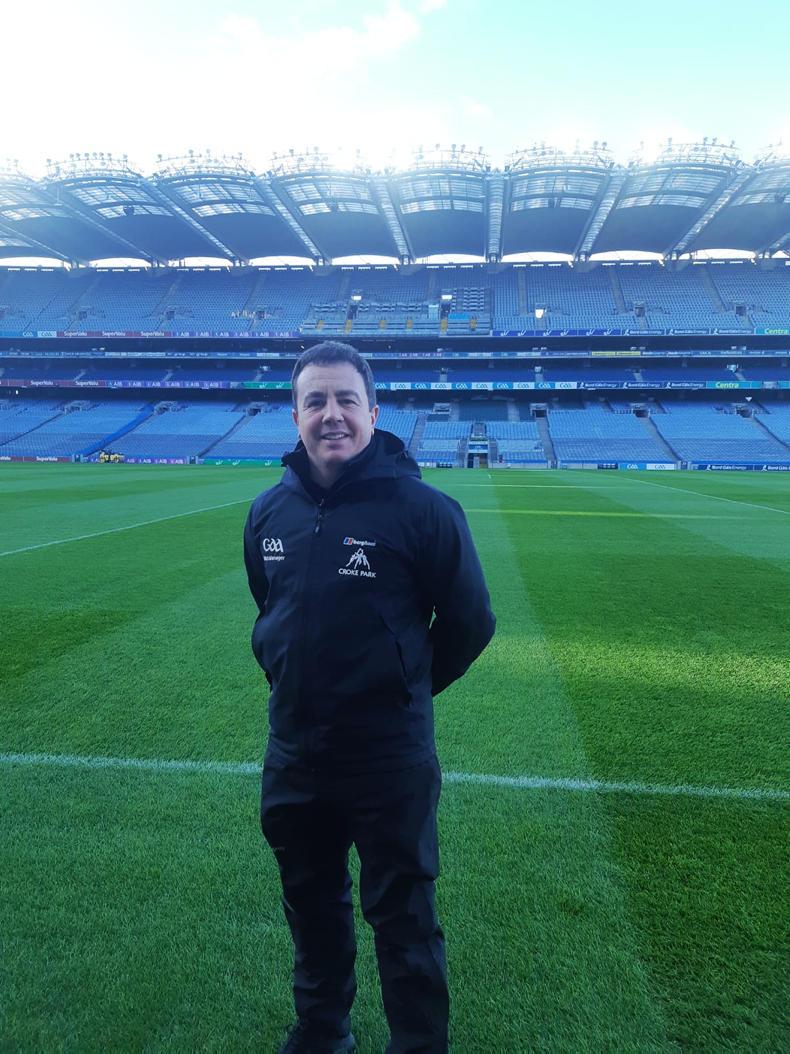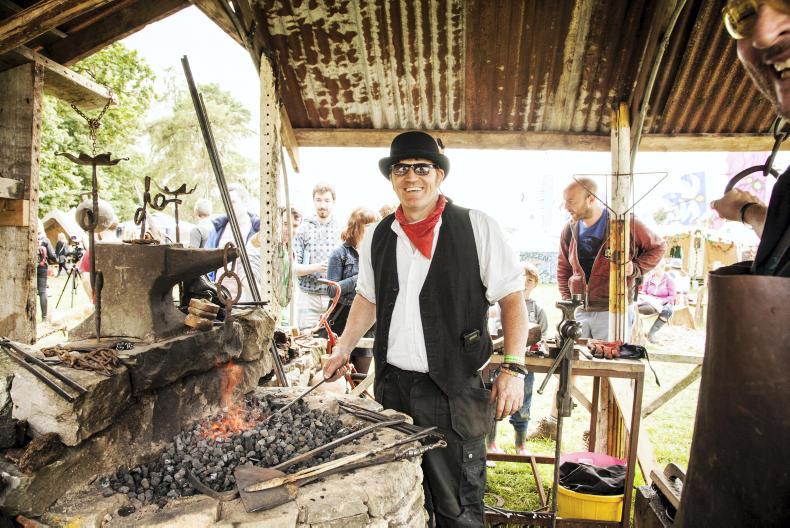Croke Park is always seen with its short green grass and crisp, straight white lines. Pitch manager Stuart Wilson and the excellent team around him ensure it’s in tip-top shape day in, day out. Although part of it, it’s so much more than running the lawnmower over the pitch and painting a few lines. That comes second. The most important thing is the playability of the pitch.

Croke Park pitch manager Stuart Wilson.
Stuart has been in the sportsturf industry for over 20 years starting out greenkeeping in Woburn Golf and Country Club, after he finished his A levels in the UK. He had a spell as deputy head groundsman in Arsenal’s Emirates Stadium before meeting and marrying Irishwoman Sonya and moving to Ireland. Ten years ago, he became deputy head groundsman in the Aviva Stadium.
“I had to go for the pitch manager role in Croke Park because it’s such a huge job. It is the third-biggest stadium in Europe. I have been here for just over eight years and the role has evolved.”
High usage
“The job is important because the players need the best possible playing surface to play on. It’s a difficult job because of the usage levels in Croke Park.”
Croke Park is one of the most-used stadium pitches in the world. There are over 90 events on the pitch most seasons including mid-season concerts. There can be on occasion four, five, even six matches in a weekend.
“The attention to detail we have in here would be up there with some of the best. It’s very hard for us to compete with other stadia when it comes to the quality of the pitch all year round and that’s purely because we have so many more matches.
“To keep grass cover in those busy periods is very difficult, people tend to forget that you’re dealing with something that is living and describe it in simple terms as if you continue to beat the grass up it’s eventually going to die and that’s what you see happening.
“It needs to be protected, cared for and looked after. It’s no different to me and you being looked after so it needs feeding, the soil needs to be able to breathe and things like that.”
Turf farm
Croke Park bought a 67ac farm in north Co Dublin for the purpose of turf growing and replacing sections of pitch.
“It’s very unique and very special. There wouldn’t be too many stadia in the world growing their own turf to replace sections after concerts.”
In 2019, the first turf grown on the farm was transported to Croke Park to replace a section of the pitch after a concert. The whole process from harvesting to laying took a couple of hours compared to the day it takes when the turf used to be transported all the way from England. This meant that the ground team had more time to prepare the pitch for the next match.
“That was probably the most nerve-wrecking of all my time here. Once everything was in place, it went very smoothly. The harvesting team harvested the turf at 7.30am, put it on the lorry and travelled down to the stadium and we were laying it by 9.30am. It was amazing how quickly everything went.”
The current pitch is coming up to its 10th year, and the team is looking to grow their own pitch on the farm to move into Croke Park in September.
Playability
Stuart points out that if the pitch isn’t looked after properly, it would deteriorate quickly.
“We’re the national stadium, we need to be setting standards and examples for groundsmen around the country.
“If it didn’t have all of the input practices that we put into the pitch then you would see a very poor-quality pitch that wouldn’t play particularly well either.”
Stuart and his team try to ensure that the playability of the pitch is at its best. The pitch has to be just right, not too firm and not too soft because either would affect the players’ performance. If the pitch is too firm then the groundskeepers would spike the pitch to aerate it.
“We’re constantly testing the pitch for firmness, moisture, traction, ball bounce and that to ensure that it meets the parameters that we want to meet for Gaelic sport. If we weren’t to care for the pitch then those parameters wouldn’t be met and the pitch will struggle, meaning that you would probably have poor-quality games being played in Croke Park.”
So what makes Croke Park pitch perfect?
“For the perfect pitch you will want grass cover to be above 80%, the higher the percentage the better-quality the pitch will be. Moisture content can be anything between 15% to 25%, but anything above that you might find that the pitch will be too soft.
“In the winter time it’s very hard to manage the moisture content because you can’t turn the rain off. During the summer time we have irrigation systems on the pitch and that is something that we would manage very closely, using probes to measure the moisture in the pitch.” CL
Read more
Pitch perfect
A cut above the rest at Aviva Stadium
Living Life: aiming for the stars
Croke Park is always seen with its short green grass and crisp, straight white lines. Pitch manager Stuart Wilson and the excellent team around him ensure it’s in tip-top shape day in, day out. Although part of it, it’s so much more than running the lawnmower over the pitch and painting a few lines. That comes second. The most important thing is the playability of the pitch.

Croke Park pitch manager Stuart Wilson.
Stuart has been in the sportsturf industry for over 20 years starting out greenkeeping in Woburn Golf and Country Club, after he finished his A levels in the UK. He had a spell as deputy head groundsman in Arsenal’s Emirates Stadium before meeting and marrying Irishwoman Sonya and moving to Ireland. Ten years ago, he became deputy head groundsman in the Aviva Stadium.
“I had to go for the pitch manager role in Croke Park because it’s such a huge job. It is the third-biggest stadium in Europe. I have been here for just over eight years and the role has evolved.”
High usage
“The job is important because the players need the best possible playing surface to play on. It’s a difficult job because of the usage levels in Croke Park.”
Croke Park is one of the most-used stadium pitches in the world. There are over 90 events on the pitch most seasons including mid-season concerts. There can be on occasion four, five, even six matches in a weekend.
“The attention to detail we have in here would be up there with some of the best. It’s very hard for us to compete with other stadia when it comes to the quality of the pitch all year round and that’s purely because we have so many more matches.
“To keep grass cover in those busy periods is very difficult, people tend to forget that you’re dealing with something that is living and describe it in simple terms as if you continue to beat the grass up it’s eventually going to die and that’s what you see happening.
“It needs to be protected, cared for and looked after. It’s no different to me and you being looked after so it needs feeding, the soil needs to be able to breathe and things like that.”
Turf farm
Croke Park bought a 67ac farm in north Co Dublin for the purpose of turf growing and replacing sections of pitch.
“It’s very unique and very special. There wouldn’t be too many stadia in the world growing their own turf to replace sections after concerts.”
In 2019, the first turf grown on the farm was transported to Croke Park to replace a section of the pitch after a concert. The whole process from harvesting to laying took a couple of hours compared to the day it takes when the turf used to be transported all the way from England. This meant that the ground team had more time to prepare the pitch for the next match.
“That was probably the most nerve-wrecking of all my time here. Once everything was in place, it went very smoothly. The harvesting team harvested the turf at 7.30am, put it on the lorry and travelled down to the stadium and we were laying it by 9.30am. It was amazing how quickly everything went.”
The current pitch is coming up to its 10th year, and the team is looking to grow their own pitch on the farm to move into Croke Park in September.
Playability
Stuart points out that if the pitch isn’t looked after properly, it would deteriorate quickly.
“We’re the national stadium, we need to be setting standards and examples for groundsmen around the country.
“If it didn’t have all of the input practices that we put into the pitch then you would see a very poor-quality pitch that wouldn’t play particularly well either.”
Stuart and his team try to ensure that the playability of the pitch is at its best. The pitch has to be just right, not too firm and not too soft because either would affect the players’ performance. If the pitch is too firm then the groundskeepers would spike the pitch to aerate it.
“We’re constantly testing the pitch for firmness, moisture, traction, ball bounce and that to ensure that it meets the parameters that we want to meet for Gaelic sport. If we weren’t to care for the pitch then those parameters wouldn’t be met and the pitch will struggle, meaning that you would probably have poor-quality games being played in Croke Park.”
So what makes Croke Park pitch perfect?
“For the perfect pitch you will want grass cover to be above 80%, the higher the percentage the better-quality the pitch will be. Moisture content can be anything between 15% to 25%, but anything above that you might find that the pitch will be too soft.
“In the winter time it’s very hard to manage the moisture content because you can’t turn the rain off. During the summer time we have irrigation systems on the pitch and that is something that we would manage very closely, using probes to measure the moisture in the pitch.” CL
Read more
Pitch perfect
A cut above the rest at Aviva Stadium
Living Life: aiming for the stars









SHARING OPTIONS